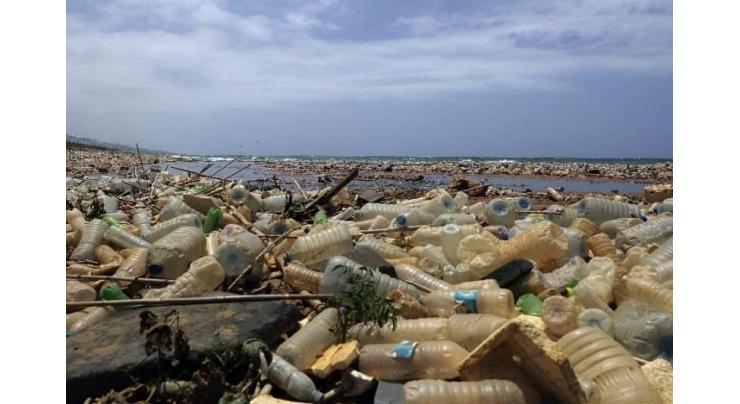
Oceans Of Garbage Prompt War On Plastics
Mohammad Ali (@ChaudhryMAli88) Published December 15, 2018 | 01:15 PM

Faced with images of turtles smothered by plastic bags, beaches carpeted with garbage and islands of trash floating in the oceans, environmentalists say the world is waking up to the need to tackle plastic pollution at the source.
Paris, (APP - UrduPoint / Pakistan Point News - 15th Dec, 2018 ) :Faced with images of turtles smothered by plastic bags, beaches carpeted with garbage and islands of trash floating in the oceans, environmentalists say the world is waking up to the need to tackle plastic pollution at the source.
Stories on social media of giant seas of floating waste or a beached whale found in Indonesia with six kilos (13 Pounds) of plastic in its stomach are bringing plastic pollution into the spotlight.
"There is no question plastic is having a moment," said George Leonard, chief scientist at Ocean Conservancy.
"We are in a moment in time where we are starting to stare the problem in the face, and we're quite optimistic and hopeful that we can solve it." Leonard and other environmental experts are optimistic the exposure will make the problem of plastics hard to ignore and focus attention on how best to deal with such waste.
Eight million tonnes of plastic is dumped into the oceans each year, according to a study in the Science journal.
But that is only what comes from the land, said Francois Galgani, researcher with the French institute Ifremer, estimating another two million tonnes could come from ships especially fishing vessels.
As a consequence more than 700 species are impacted, including turtles who confuse plastic bags with the jellyfish they eat, Galgani said.
More than 5 billion plastic bags are used every year, and a ban step by step, country by country is underway, the first phase towards a possible general ban. Bags could be followed by bans on plastic straws and cotton swabs.
The European Union wants to ban certain single-use plastics by the end of 2021. For Galgani, that would be good news, as it would represent around 30 to 40 percent of the plasticthat ends up in the oceans.
"Everyone is working for the good cause, even industries," he said.
Related Topics
Recent Stories

Bugti assures transporters for addressing their problems

Deputy Prime Minister and Foreign Minister, Mohammad Ishaq Dar meets foreign min ..

3 drug peddlers arrested, hashish recovered

1496,990 children given polio drops in five days: DC

Six terrorists killed, hideout busted in N Waziristan IBO: ISPR

Pakistan, Qatar agree to further expand trade, investment ties

Sindh cabinet approves Rs177.5m to strengthen, mobilize various wings of police

Faisal Karim Kundi takes oath as new KP Governor

Azad Jammu and Kashmir Prime Minister Anwaar ul Haq Chaudhry seeks more vibrant ..

Tahaffuz Manzil Foster Home providing care & support to homeless children

PCB proposes April 7 -May 20 window; tweaks in rules for HBL PSL 2025

Field hospitals now operational across Punjab: Azma Bukhari
More Stories From World
-
Football: French Ligue 1 results - collated
2 hours ago -
Football: Italian Serie A results - collated
2 hours ago -
European Champions Cup semi-final result
2 hours ago -
Football: Italian Serie A table
2 hours ago -
Tennis: WTA Madrid Open results
2 hours ago -
Formula One: Miami Grand Prix sprint race results
2 hours ago
-
Barca have 'huge amount' to change next season: coach Xavi
2 hours ago -
Haaland 'back to business' with four-goal haul in Man City rout of Wolves
2 hours ago -
Newcomer Bellingham Madrid's driving force in La Liga conquest
3 hours ago -
Girona players have made history, says coach after reaching Champions League
3 hours ago -
Reus begins farewell tour while Bayern stumble in Stuttgart
3 hours ago -
Real Madrid La Liga title win in numbers
3 hours ago